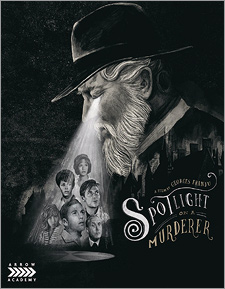Spotlight on a Murderer (Blu-ray Review)

Director
Georges FranjuRelease Date(s)
1961 (May 30, 2017)Studio(s)
Champs-Élysées Productions/MGM/Gaumont (Arrow Academy)- Film/Program Grade: B
- Video Grade: A-
- Audio Grade: A-
- Extras Grade: D+
Review
The most well-known film that Georges Franju made during his brief run is unquestionably Eyes Without a Face, and not far behind that is Judex. One of his more underappreciated efforts, more so in the era that it was released in, is Spotlight on a Murderer (Pleins feux sur l’assassin). A seemingly straightforward tale of a missing count, the heirs to his castle and fortune, and the unknown person attempting to bump them off one at a time didn’t impress many critics when it initially hit theaters in France in 1961. Many years later, it’s still a minor film in his filmography, but is now (and rightly so) a much more valued piece of work retrospectively.
Described most accurately as Agatha Christie by way of French arthouse, the film’s castle setting and the cinematography employed to capture it are top of the line, allowing it to look anything but run of the mill. And while the murder mystery plot is certainly intriguing, the ending is, unfortunately, not quite as satisfying, which often occurs with a lot of whodunits. The hook of the deceased count being hidden behind a mirrored wall for the entirety of the story isn’t paid off particularly well, while the reveal of the killer happens more as a matter of a fact rather than having much of a build. On the other hand, it may be that it eliminates tedious explanation. It’s obvious why the killer is doing what they’re doing, so why bother explaining it at all? Regardless, Spotlight on a Murderer plays with those murder mystery conventions, but through a French viewfinder, making the film feel geographically unique. Meanwhile, one country over, giallos were just beginning to emerge.
Arrow Academy’s transfer of Spotlight on a Murder has been “digitally restored by Gaumont from original film elements.” Not knowing the lineage of the presentation would be more important if it wasn’t visually-pleasing, and in this case, it is. It’s organic-looking and film-like with a thin layer of grain, which appears to be even from scene to scene. High levels of fine detail are on display, aside from black areas of the frame, which carry some crush during scenes of extreme darkness (likely inherent in the original cinematography). Depth is often impressive with excellent grayscaling and appropriate brightness and contrast levels. There’s also next to no film artifacts left behind and the frame itself is quite stable. I also didn’t notice any digital artifacts, so the encode is quite solid as well. The only audio option available is a French 2.0 mono LPCM track with optional, and newly-translated, English subtitles, which play automatically when starting up the film. The track isn’t totally narrow as it features excellent fidelity, most notably in score selections and dialogue exchanges, the latter of which has obvious reverb and echo (as it should in a castle). There’s also decent ambience from time to time, although sound effects tend to be a tad thin. Some extremely light hiss is leftover, which is more noticeable during the film’s quieter moments, but the track is otherwise clean and free of pops, crackle, or dropouts.
The extras selection is extremely brief, but you do get the Le Courrier du Cinéma vintage production featurette; the original theatrical trailer; a DVD copy of the film; and a 40-page insert booklet with the film essays “Cinema Insolite” by Chris Fujiwara, “Spotlight on a Murderer” by Raymond Durgnat, and “Spotlight on Boileau, Narcejac, Franju and Their Last Murderer” by Francis Lacassin & Raymond Bellour, as well as restoration details.
I have a feeling that in years to come, Spotlight on a Murderer is going to have more eyes on it than it does now. And thanks to Arrow Films’ efforts, we now have a terrific Blu-ray presentation of it to draw upon. It’s certainly not the best film that Georges Franju ever made, but it has as much lasting appeal as his other, more noteworthy films have.
- Tim Salmons

